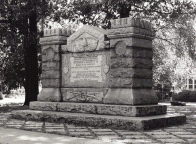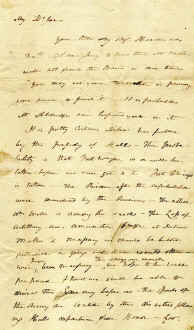Browsing in Our Archives: Colonel Allen Goes to War
By James J. Holmberg
Special Collections Curator
About |
Before the famous cry of "Remember the Alamo!" echoed
across the American public, another declaration, equally
fervent, was heard in the War of 1812 Ė "Remember the River Raisin!"
There were plenty of American defeats and embarrassments in a war that, despite
the famous victory at New Orleans, was essentially a stalemate. One of the early
defeats was the surrender by General James Winchester of his force at Frenchtown
(now Monroe) on the River Raisin, south of Detroit, on January 22, 1813. Of the
934 Americans (almost all Kentuckians), who fought at Frenchtown, only 33
escaped capture or death. On the morning of January 23, Indians murdered some 60
wounded Kentucky captives. Denounced as the River Raisin Massacre,
"Remember the River Raisin!" became a rallying cry for Kentuckians for
the rest of the war.
equally
fervent, was heard in the War of 1812 Ė "Remember the River Raisin!"
There were plenty of American defeats and embarrassments in a war that, despite
the famous victory at New Orleans, was essentially a stalemate. One of the early
defeats was the surrender by General James Winchester of his force at Frenchtown
(now Monroe) on the River Raisin, south of Detroit, on January 22, 1813. Of the
934 Americans (almost all Kentuckians), who fought at Frenchtown, only 33
escaped capture or death. On the morning of January 23, Indians murdered some 60
wounded Kentucky captives. Denounced as the River Raisin Massacre,
"Remember the River Raisin!" became a rallying cry for Kentuckians for
the rest of the war.
One of the Kentuckians killed in the actual battle, rather than
the massacre, was Colonel John Allen. Born in Virginia in 1771, Allen moved to
Kentucky as a small boy. Educated in Kentucky and Virginia, he settled in  Shelby
County in 1795. Allen established a successful law practice, served in the
Kentucky legislature, was one of Aaron Burrís defense attorneys, and in 1808
ran unsuccessfully for governor. On December 21, 1798, he married Jane Logan,
the daughter of famous pioneer Benjamin Logan.
Shelby
County in 1795. Allen established a successful law practice, served in the
Kentucky legislature, was one of Aaron Burrís defense attorneys, and in 1808
ran unsuccessfully for governor. On December 21, 1798, he married Jane Logan,
the daughter of famous pioneer Benjamin Logan.
On June 5, 1812, Allen was commissioned a colonel in the Kentucky militiaís 1st Ri.e Regiment. This was the first Kentucky regiment raised for the war. By August, the regiment was encamped near Cincinnati, preparing to march northward against the British and their Indian allies as part of an American army under the command of William Henry Harrison. How many letters John Allen wrote home to his wife isnít known, but this letter from The Filsonís archives records the thoughts and concerns of a Kentuckian who would not return home.
My Dr. Jane
Your letter By Mjr. Hardin1 was recd. I am sorry to hear that Mr. Miller will not finish the Barn in due
time. you may use your discretion in procering some person to finish it. It is probable Mr. Aldridge can
not finish the Barn in due
time. you may use your discretion in procering some person to finish it. It is probable Mr. Aldridge can
befriend you in it.
It is pretty Certain Detroit has fallen by the perfidy of Hull2. The probability is that Fort Wayne is or will be taken before we can get to it. Fort Chicago is taken. The Prisoners after the capitulation were murdered by the Indians. The noted Wm. Wells3 is among the dead. The Loss of artillary, arms amunition & c & c at Detroit makes it necessary we should be better provided in going out than would otherwise have been necessary. This delays our march. We hope to be well prepared & trust we shall be able to drive the Enemy before us. The Spirits of the Army are Excited by the disasters following Hulls departure from Honor. Govr. Harrison4 is with us and takes the command.
Our Camp is at Mill Creek near Cincinnati.
In haste for yourself our dear Children & our friends with & near you, accept the best wishes of yr. Husband & friend
John Allen
28th Augt.1812
![]()
The Filson Historical Society
1310 South Third Street - Louisville, KY 40208
Phone: (502) 635-5083 Fax: (502) 635-5086
Hours
The Ferguson Mansion and Office
Monday - Friday: 9 am. - 5 pm.
Saturday and Sunday closed
Library
Monday - Friday: 9 am. - 5 pm.
Saturday: 9 am. - 12 noon
